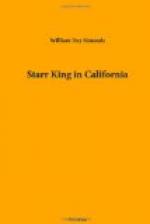Moreover oratory today is at its ebb, as it has been a hundred times before, and with us the man of eloquence passes to quick oblivion. It would be futile to deny that the common fate of orators has overtaken Starr King. Even in California the present generation knows painfully little of his great services to the State. This is the first serious attempt, let us hope it will not be the last, accurately to measure the extent and value of that service so nobly rendered. It is gratifying, however, to recall that Californians of his own time, and the years immediately following, paid ample tribute to his work and his memory. Extraordinary honors, such as never have been given to any private citizen, were freely and lovingly accorded the patriot-preacher.
On the evening of March 4, 1864, the day of King’s death, the San Francisco Bulletin, then, as now, one of the leading papers of the city, contained the following tribute:
“The announcement of the death of Rev. Thomas Starr King startles the community, and shocks it like the loss of a great battle or tidings of a sudden and undreamed of public calamity. Certainly no other man on the Pacific Coast would be missed so much. San Francisco has lost one of her chief attractions; the State, its noblest orator; the country one of her ablest defenders.”
Scarcely forty years of age, a Californian only from 1860 to 1864, he had in this brief period so won the hearts of men that in honor of his funeral the legislature and all the courts adjourned, the national authorities fired minute guns in the bay, while all the flags in the city and on the ships hung at half-mast, including those of the foreign consuls and those on the vessels of England, Russia, Hamburg, Columbia and France. It is believed that in American history no private individual has been so honored by the federal army and by foreign nations.
That Starr King’s tomb might serve as a daily reminder to the people of his unique devotion to Union and Liberty, a city ordinance forbidding burials within certain districts of the city was set aside, and to this day his grave can be seen close to one of San Francisco’s busy thoroughfares. Nor is this all. One of the giant trees of the Mariposa bears his name and a proud dome of the Yosemite is called Starr King. On the 27th of October, 1892, a beautiful and impressive monument was dedicated in Golden Gate Park to his memory. Its base bears the inscription:
“In him eloquence, strength and virtue were devoted with fearless courage to truth, country and his fellow-men.”
The dedication address was given by the Hon. Irving M. Scott, a leading business man of San Francisco. Speaking with the care and sobriety the occasion demanded, Mr. Scott made the following statement, which the writer believes will also be the sober verdict of history:
“We do not say that Starr King determined for California the course which she pursued; but we do say that he was the most potent factor in effecting that determination.”




